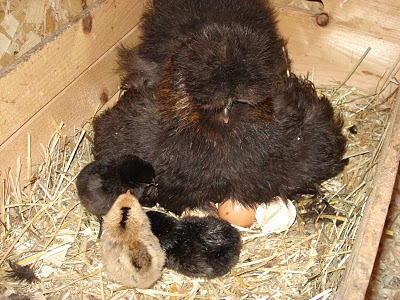
(Delilah's last clutch)
I love parasites of all sorts. I suppose that's why by day I pretend to be a budding Microbiologist. I don't however, like parasites in my chickens (or any of my other pets, for that matter). When we first got our chickens only 9 short months ago, we thought we'd be immune to all the chicken nasties that must only be see in CAFOs (confined animal feeding operations). Since then we've seen a chicken die of a mysterious illness (mysterious to the newby chicken owner anyhow), a chicken die of what we think was crop worm, and lice, leg mites, and roundworms. Here's what we've learned:
Leg mites seem easy enough to treat. We used linseed oil to coat the legs and soften the tissues, then covered them with Vik's Vapor Rub. Seems to be working like a charm as the few infected chicken leggies seem to be returning to normal.
The lice has been a bit trickier. We've tried everything from thoroughly cleaning the coop and spraying it down with a product called Orange Guard to a cedar spray on the feathers. We try to do everything naturally and stay away from chemical treatments, however there is a time a place for them. We eventually ended up treating two of our hens with a Permethrin powder for poultry as their infestations were pretty severe. To manage the problem we add a few cups of DE (diatomaceous earth) to their favorite dusting bowl to roll around in. DE comes from the tiny microscopic fossilized remains of diatoms (hence the name), which are a type of hard-shelled algae. We have found DE to be beneficial on so many levels. DE is good in gardens to deter insects and slugs as it is abrasive to their bodies. We now spread it all over the coop each cleaning and in the nest boxes. Amazingly we can't find a single lice on any of our chickens now! I'm thrilled with that. Perhaps this is our key to maintenance. I am even trying it out on another new 'problem'.....
Roundworms. It's been hotter than blazes out this whole week. A far cry from the previous post where I said it felt like fall; and it did! One of our little silkie hens, Delilah, is sitting on a clutch of 12 silkie eggs. Not hers. We bought them from someone who could guarantee they were full silkie. I like this breed. Due to the number of new chickens in the coop at the moment we felt it necessary to put a big dog cage around her to prevent 1) other hens from sneaking in there to lay their eggs, and 2) this years 'chicks' from pouncing all over her. Since the temperature has crept into the high 90s all week, and the temperature in the coop is over 100, we decided to bring her into the house (she's on the back porch) for a few days until this heat wave passes. She's much more comfortable it seems. The things we do for our chickens. Anyway, yesterday I watched her hop off her nest to get a drink and a peck of food. Of course eating = digestion = peristalsis = poop! And boy did she ever poop. I think she pooped half her weight it was so big. And there wiggling around (not really wiggling, but moving) was a roundworm. And if she's got roundworms, someone else probably does too. So it's best to worm them all. The commercial treatment for roundworms is Piperazine, which requires that you discard your eggs for two weeks after treatment with a second treatment in 3 weeks (which means discarding those eggs for another two weeks). So I did a little online research and found that DE can be added to the feed to eliminate intestinal parasites. Well golly! I think I'm going to try that first and see how it goes. Garlic and ACV (apple cider vinegar) can also be added as both have been noted to aid in the elimination of parasites. I'll let you know how it goes.
And that's all I have to say about that (at least for now).

No comments:
Post a Comment